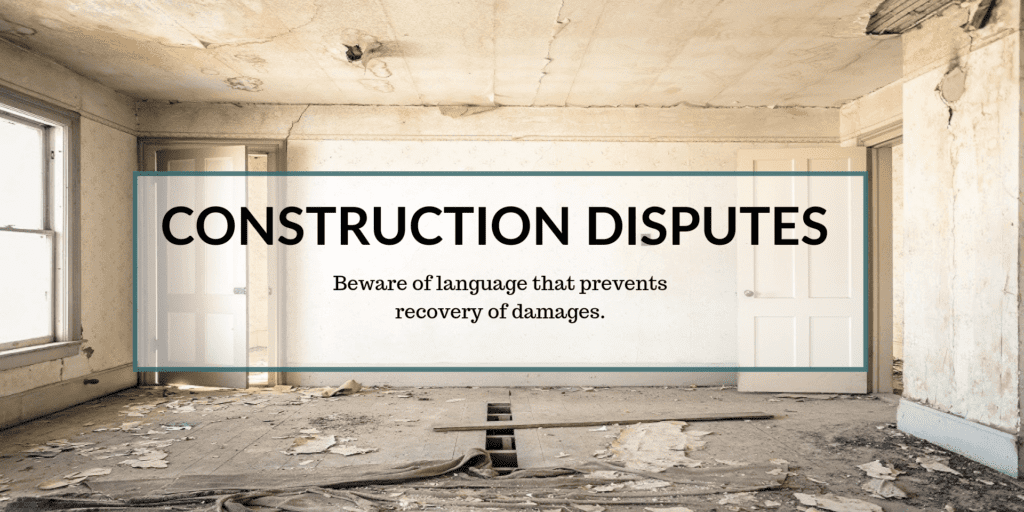Under Florida law, when a party violates or “breaches” a contract, the amount of money the non-breaching party is entitled to recover depends on the types of damages allowed by law and/or the parties’ contract. As a result, it is common for contracts to exclude recovery of certain types of damages.
If a general contractor or owner signs a boilerplate contract with certain damages exclusions, a court may be compelled to find that party “bargained away” his or her right to recover those damages. Bargaining away certain damages is a big deal, since that means the amount of money to which a party may be entitled is limited—even if the other person or company is in the wrong.
1. Types of Damages
Damages fall into various categories. In the case of Keystone Airpark Authority v. Pipeline Contractors, Inc., 266 So.3d 1219 (Fla. 1st DCA 2019), the court explained the difference between a few of these types of damages.
“General damages” are damages which “naturally and necessarily flow or result from the injuries alleged; they are commonly defined as those damages which are the direct, natural, logical and necessary consequences of the injury. Id.
“Special damages” are “damages that are not likely to occur in the usual course of events, but may reasonably be supposed to have been in contemplation of the parties at the time they made the contract.” Id.
A third category of “consequential damages” were at issue in Keystone Airpark, in part because a third party was involved. Usually, consequential damages “do not arise within the scope of the immediate buyer-seller transaction, but rather stem from losses incurred by the non-breaching party in its dealings, often with third parties, which were a proximate result of the breach, and which were reasonably foreseeable by the breaching party at the time of contracting.” Id.
2. Keystone Airpark
Keystone Airpark involved a local airpark that built new hangars and taxiways. The airpark wanted to ensure the contractor building the hangars would perform its work properly. So, the airpark contracted with Passero, an engineering firm, to supervise the construction of the hangars. Passero agreed to “[o]bserve the work to determine conformance to the contract documents and to ascertain the need for correction or rejection of the work,” and to “[d]etermine the suitability of materials…to be used for construction.” In spite of the airpark’s precautionary measures, Passero ultimately allowed the contractor’s use of substandard materials to go unnoticed. Consequently, the hangars and taxiways deteriorated prematurely.
The trial court entered partial summary judgement in favor of Passero, finding no liability per the terms of its contract with Keystone Airpark. Even though Passero contracted to supervise the construction project, the appellate court affirmed the trial court’s ruling and concluded the airpark was not entitled to recover the costs to remove, repair, and replace the hangars and taxiways. The primary reason Passero avoided paying those costs to the airpark was the boilerplate contract language to which the airpark had unwittingly agreed.
Specifically, the owner-engineer contract stipulated that Passero did not have to pay any “indirect, special, incidental, punitive, or consequential damages.” Id. Each of those words refer to a different type of damages, and each type of damages represents potential damages that, arguably, the owner could not recover from the engineer. Since the contract bargained away consequential damages, the court had to determine whether the costs of removing, repairing, and replacing the hangars were consequential damages or something else that was not excluded by the contract.
In doing so, the court looked for analogous circumstances to determine whether the owner’s damages were consequential or general. The court reasoned that the agreement between the airpark and Passero was similar to agreements between homeowners and termite inspectors.
Under Florida law, if a termite inspector says a home is termite-free when it is not, in those circumstances, the costs of repairing termite damage are considered consequential damages. The general damages are basically the cost of a refund. Thus, since the costs of repairing termite damage are consequential, the court thought the airpark’s costs for repairing the hangars and taxiways were consequential damages, too.
It might seem odd that the law allows service providers to avoid liability for the very same costs which the service provider was hired to prevent, but the court in Keystone Airpark explicitly rejected that policy rationale.
Conclusion
The lesson to be learned from Keystone Airpark is that whenever a service provider is hired for some sort of supervisory or preventative function, the operative contract should explicitly provide for the recovery of consequential damages. At a broader level, Keystone Airpark is a reminder that any and all damages that any party to a contract may hope to recover should be explicitly included in the contract, or else they might be unavailable.
For more on this topic, consider these additional blog articles which have related information:

